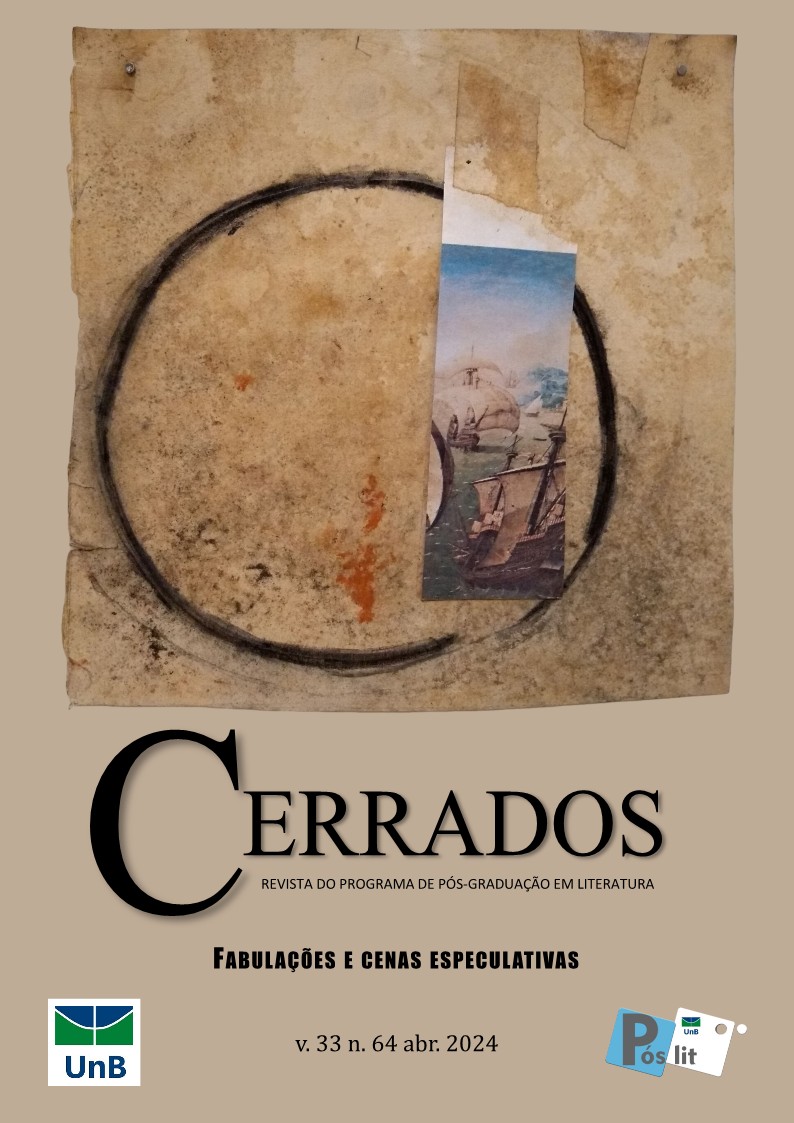Parasitic discourse in the construction of speculative fiction
fictional operations in Kindred, by Octávia Butler
DOI:
https://doi.org/10.26512/cerrados.v33i64.51854Keywords:
Speculative Fiction, Kindred, Octávia Butler, Fiction, FableAbstract
In this article, the elements considered in the characterization of Speculative Fiction are reflected in order to capture its specificities, understanding that, since the rising of this terminology, attempts to delimit the meanings have not been sporadic. However, is noticed an unstable field being built, making it difficult to recognize common denominators that can be observed in the literary exercise itself. Regarding, he sought to establish paths from which it is possible to notice recurring operations that are common to what can be called Speculative Fiction. Therefore, the theoretical postulates that underpinned Speculative Fiction developed by Stableford and Langford (1995), Oziewicz (2017) and Meireles (2021) are considered. After that, the notions of “fable” (what is narrated), “fiction” and “parasitic discourse” defined by Foucault (2013a) were used in order to understand what motivates fiction and the way in which this discourse brings into play by acquiring the adjective “speculative” as a determining element. To conclude, the novel Kindred: blood ties, written by the North-American Afrofuturist Octavia Butler (2019), was analyzed, aiming to recognize operations that could characterize her narrative as speculative fiction in the terms reflected.
Downloads
References
ARAUJO, N. S. Introdução: Ficção especulativa: considerações sobre a ficção científica e o fantástico. In: ARAUJO, N. S. (org.). Ficção especulativa: narrativa fantástica, ficção científica e horror em foco. São Luís: EDUFMA, 2021. p. 7-8.
BUTLER, O. Kindred: laços de sangue. Trad. Carolina Caires Coelho. São Paulo: Editora Morro Branco, 2019.
CAUSO, R. S. Ficção científica, fantasia e horror no Brasil — 1875 a 1950. Belo Horizonte: Editora UFMG, 2003.
FOUCAULT, M. O pensamento do exterior. In: MOTTA, M. B. (org.). Estética: Literatura e Pintura, Música e Cinema. Trad. Inês Autran Dourado Barbosa. 3ª ed. Rio de Janeiro: Forense Universitária, 2013b. p. 223-246.
FOUCAULT, M. Por Trás da Fábula. In: MOTTA, M. B. (org.). Estética: literatura e pintura, música e cinema. Trad. Inês Autran Dourado Barbosa. Rio de Janeiro: Forense Universitária, 2013a. p. 214-222.
FURTADO, F. Fantástico (modo). Disponível em: <https://edtl.fcsh.unl.pt/encyclopedia/fantastico-modo>. Acesso em 14 de março de 2023.
LIMA, G. A singularidade distópica em Neuromancer, de William Gibson. In: GAMA-KHALIL, M. M.; URZEDO, L. M. B. (Orgs.). Nos multiversos da ficção científica. Rio de Janeiro: Dialogarts, 2021. p. 241-256.
MEIRELES, A. Ficção especulativa. In: REIS, Carlos; ROAS, David; FURTADO, Filipe; GARCÍA, Flavio; FRANÇA, Júlio (Eds.). Dicionário Digital do Insólito Ficcional (e-DDIF). 2ª ed. Rio de Janeiro: Dialogarts, 2021. Disponível em: <https://www.insolitoficcional.uerj.br/ficcao-especulativa/>. Acesso em 13 de março de 2023.
NICHOLLS, P.; LANGFORD, D. Speculative Fiction. In: CLUTE, J.; NICHOLLS, P. (Eds.) The Encyclopedia of Science Fiction. New York: St. Martin’s Griffin, p. 1144-1145, 1995.
OZIEWICZ, M. Speculative Fiction. In: Oxford Research Encyclopedia of Literature. USA: Oxford Research Encyclopedia, 2017. p. 1-23.
ROBERTS, A. A verdadeira história da ficção científica: do preconceito à conquista das massas. Trad. Mário Molina. São Paulo: Seoman, 2018.
TODOROV, T. Introdução à literatura fantástica. Trad. Maria Clara Correa Castelo. 4ª ed. São Paulo: Perspectiva, 2017.
Downloads
Published
How to Cite
Issue
Section
License
Copyright (c) 2024 Revista Cerrados

This work is licensed under a Creative Commons Attribution 4.0 International License.
Proibida a reprodução parcial ou integral desta obra, por qualquer meio eletrônico, mecânico, inclusive por processo xerográfico, sem permissão expressa do editor (Lei n. 9.610 de 19/2/1998 )



